Exodus
the Bible
Parables
of the Bible
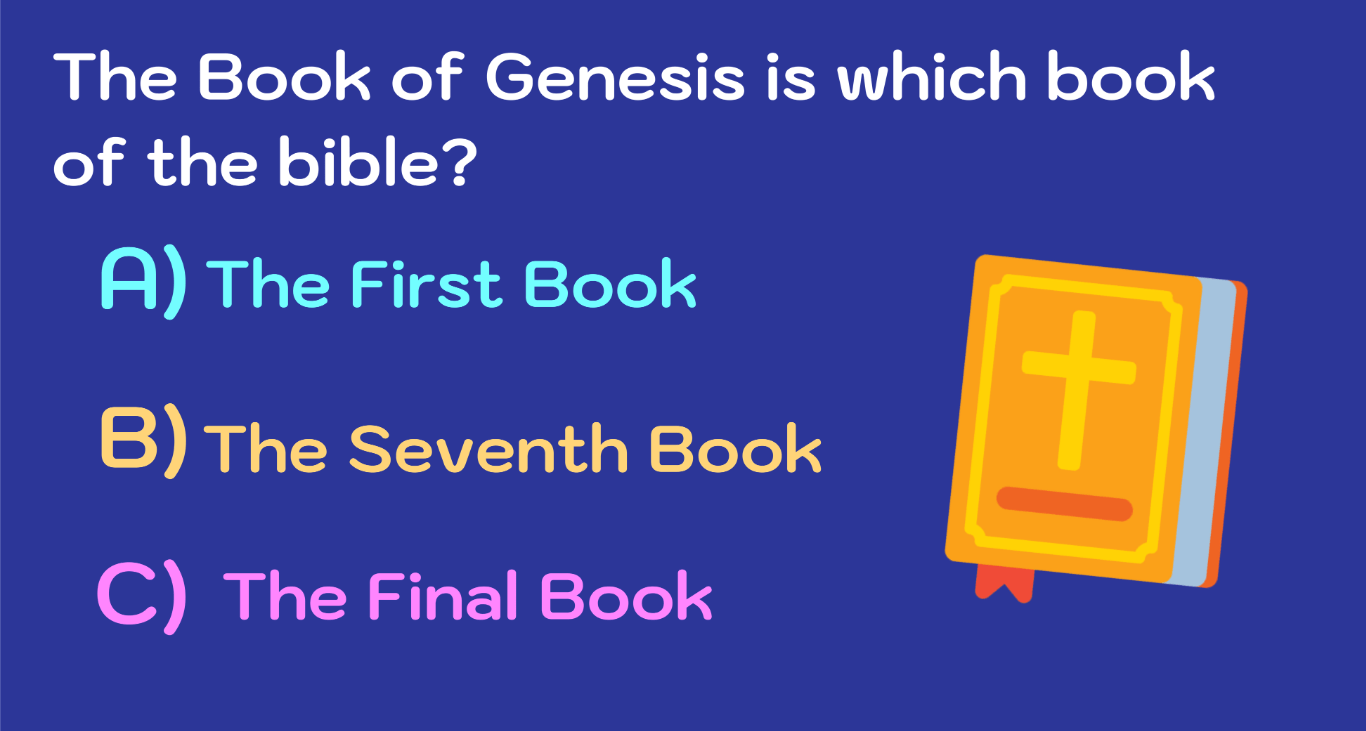
A
The first book of the Bible in the Old Testament is the Book of Genesis. The word "Genesis" means "beginning" or "origin". The book is so named because it explains the origins of many things such as the universe, the earth, people, sin, and the nation of Israel. It is traditionally believed to have been written by Moses.
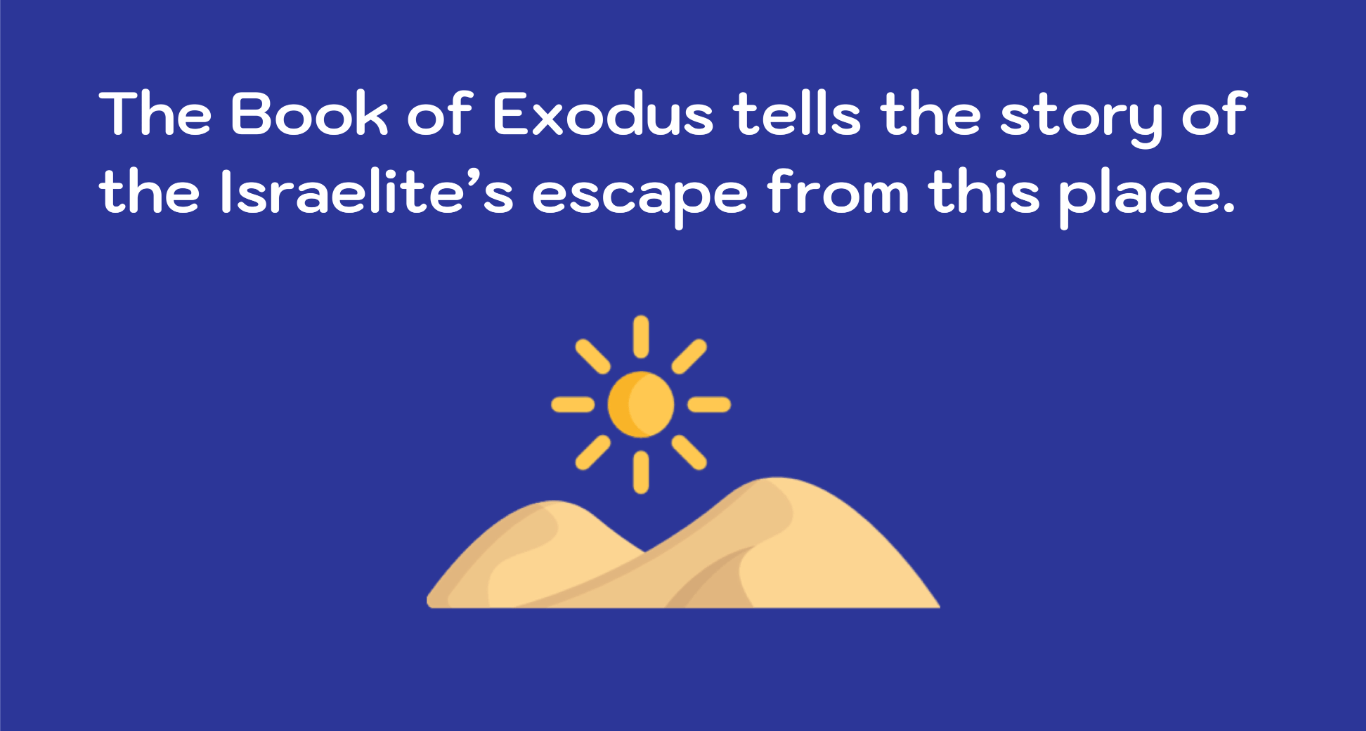
Egypt
The Israelites needed to escape Egypt due to harsh conditions of slavery imposed upon them by the Egyptian Pharaoh. According to the Book of Exodus in the Bible, the Israelites were living in Egypt and over time they grew in number and became a significant population. The Egyptians, feeling threatened by their increasing numbers, enslaved them and subjected them to hard labor.

Judas
Judas Iscariot betrayed Jesus primarily due to his greed and dissatisfaction with Jesus' teachings and actions. He made a deal with the religious authorities to hand Jesus over in exchange for thirty pieces of silver.

The Prodigal Son
The Parable of the Prodigal Son tells the story of a younger son who asks for his inheritance, squanders it in a distant country, and ends up in desperate circumstances. When he returns home, his father warmly embraces him, highlighting the themes of God's unconditional love, forgiveness, and the joy of repentance and reconciliation.
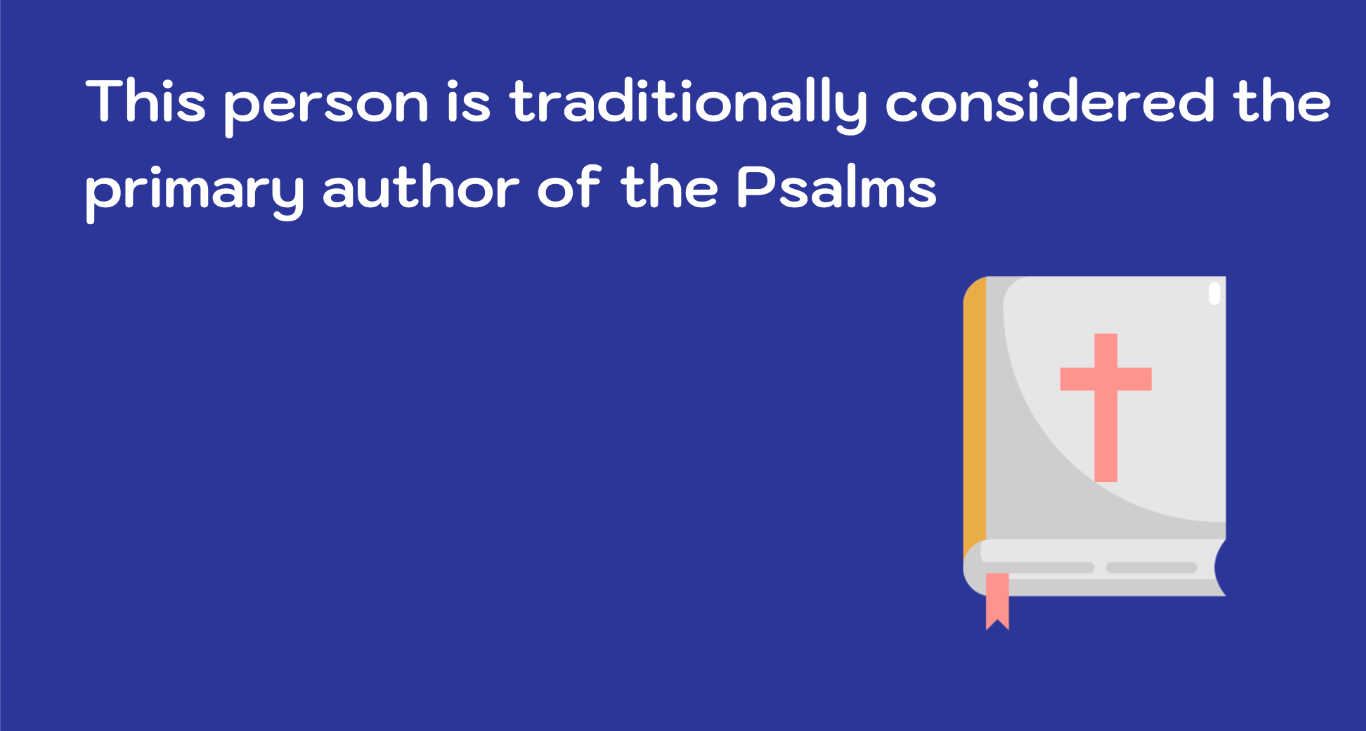
David
David, often known as King David, is traditionally attributed to writing many of the psalms found in the book of Psalms in the Bible. He was a skilled musician, a poet, and a man of deep faith who expressed his emotions, struggles, praises, and prayers to God through these psalms, making a personal and profound connection between his own experiences and the worship of God.
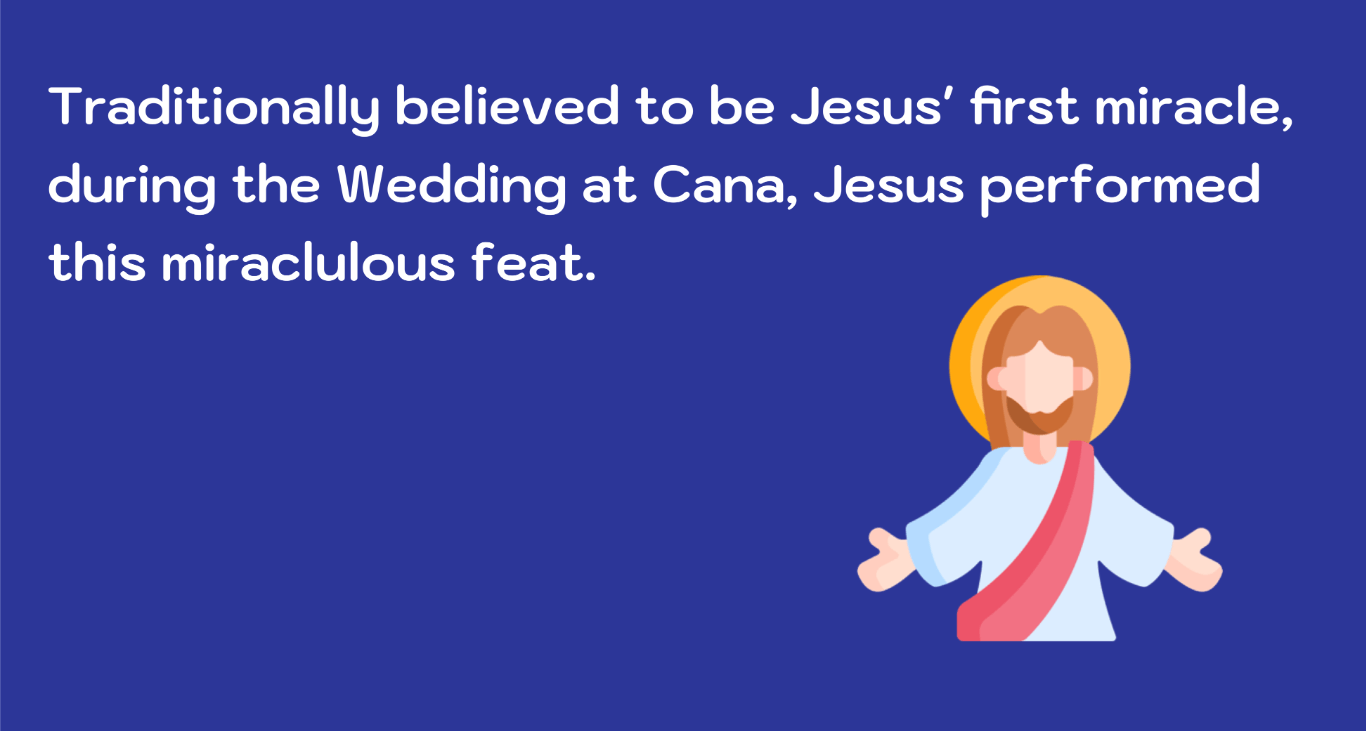
He Turned Water into Wine
At a wedding in Cana, when the celebration was in danger of ending prematurely due to a shortage of wine, Jesus performed his first recorded miracle by transforming six jars of water into high-quality wine. This event, demonstrating Jesus's divine power over nature, not only saved the wedding feast but also marked the beginning of his public ministry according to the Gospel of John.
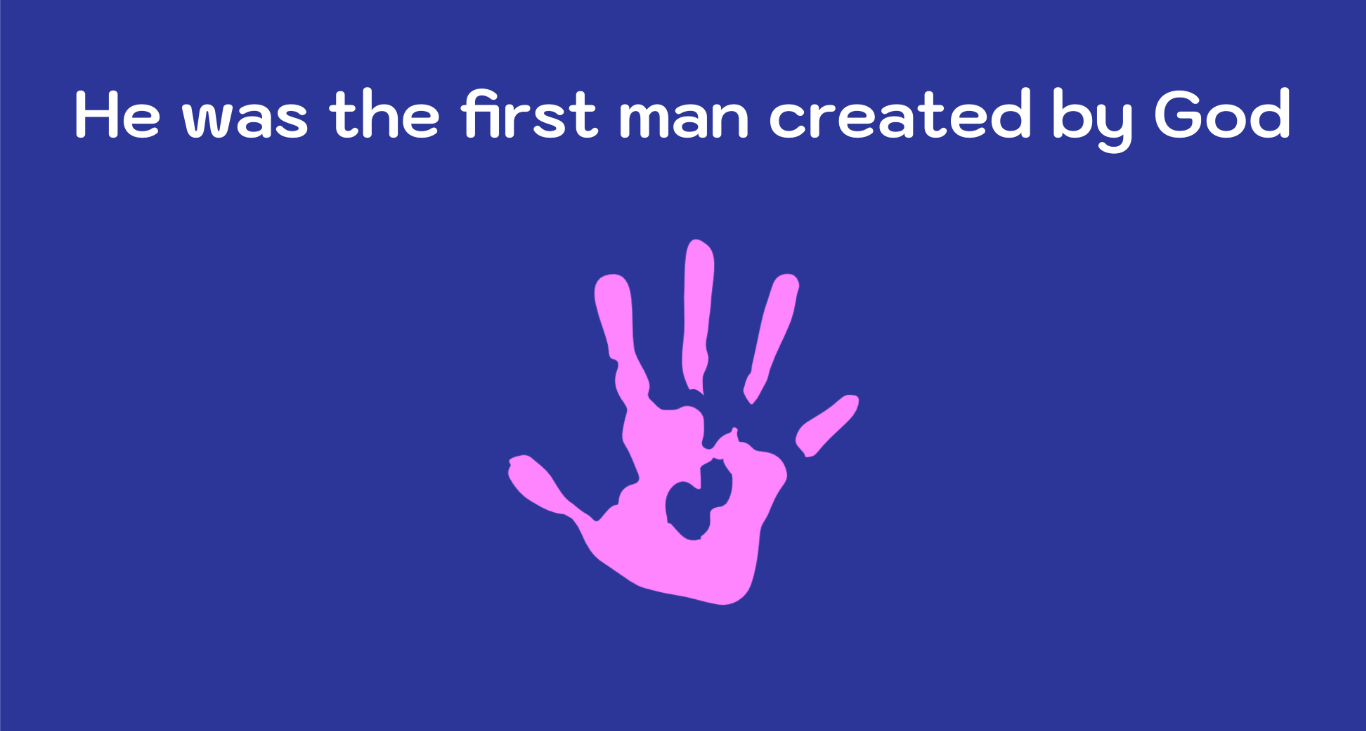
Adam
In Genesis 2:7, it is written: "Then the Lord God formed a man from the dust of the ground and breathed into his nostrils the breath of life, and the man became a living being."
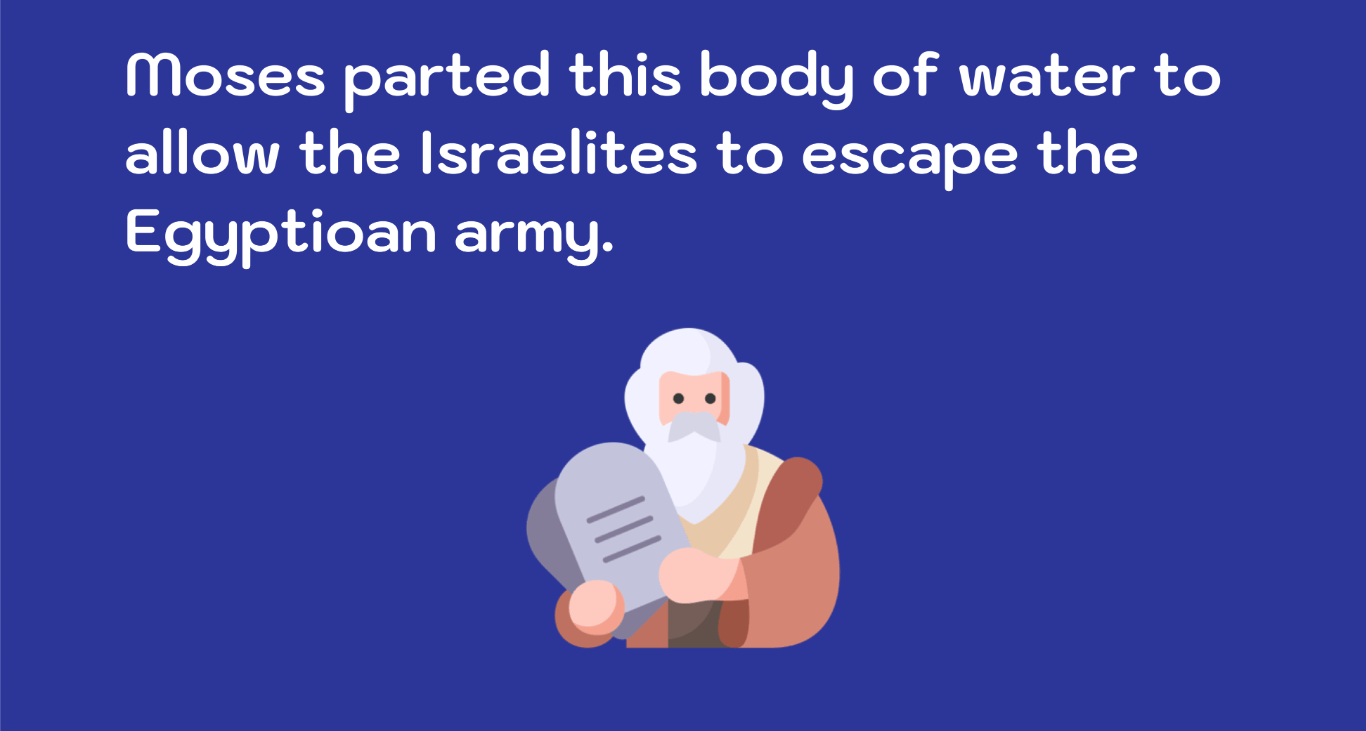
The Red Sea
After the Israelites, led by Moses, escaped from slavery in Egypt, the Pharaoh changed his mind about letting them go. He sent his army to pursue them. The Israelites found themselves trapped between the Red Sea and the approaching Egyptian army.
In response to this desperate situation, Moses, following God's command, stretched out his staff over the sea, and God caused the sea to part, creating a dry path through the middle. The Israelites crossed the sea on this dry ground.

Jonah
Jonah was swallowed by a fish as a consequence of his disobedience to God's command to go to Nineveh and deliver a message of repentance. The fish served as a means of rescue and discipline, giving Jonah time to reflect and repent before being vomited out onto dry land.
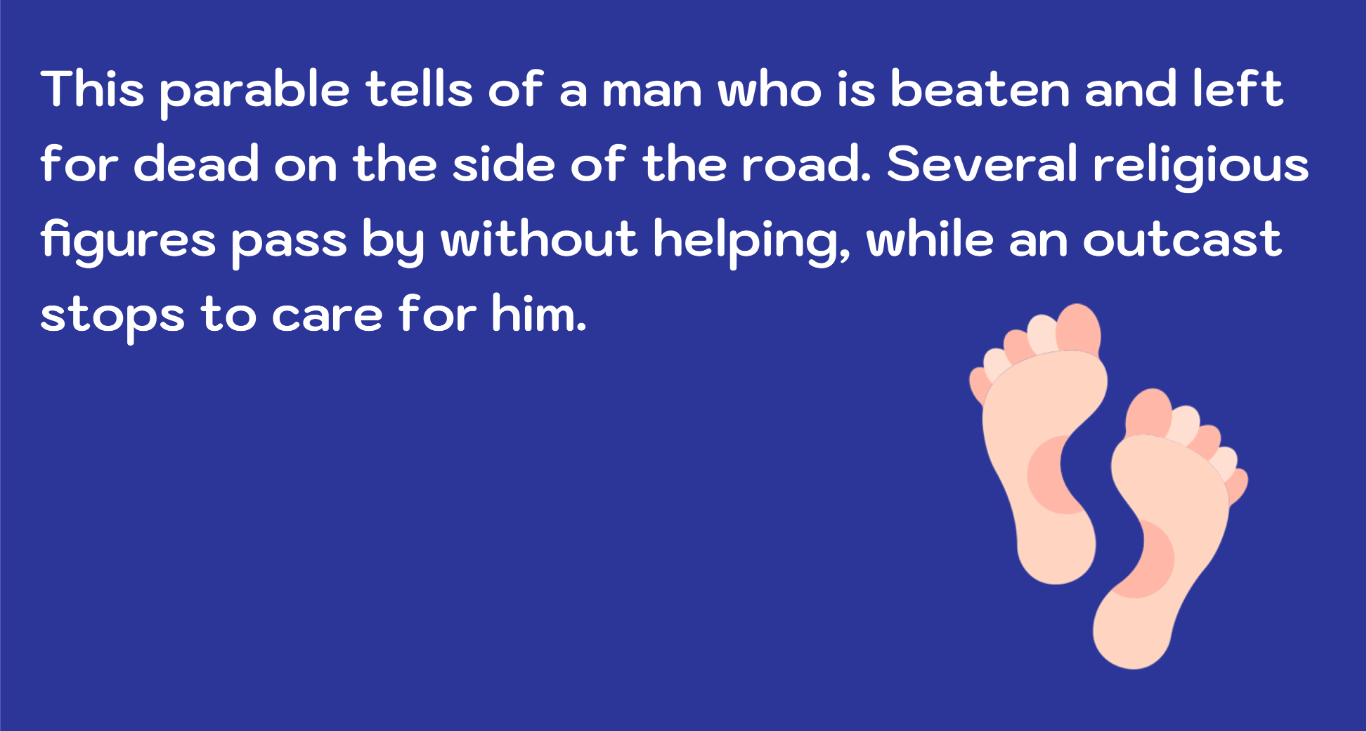
The Good Samaritan
The Good Samaritan parable recounts a man who is robbed, beaten, and left for dead on the road. While religious figures pass by without helping, a Samaritan, traditionally seen as an outcast, shows compassion, cares for the wounded man, and teaches the importance of loving one's neighbor and demonstrating kindness to all, regardless of social or cultural differences.

The Darkest Valley / The Valley of the Shadow of Death
The Lord is my shepherd; I shall not want. He makes me lie down in green pastures; He leads me beside still waters. He restores my soul; He leads me in paths of righteousness for His name's sake. Even though I walk through the valley of the shadow of death, I will fear no evil, for You are with me; Your rod and Your staff, they comfort me. You prepare a table before me in the presence of my enemies; You anoint my head with oil; my cup overflows. Surely goodness and mercy shall follow me all the days of my life, and I shall dwell in the house of the Lord forever." (Psalm 23:1-6)
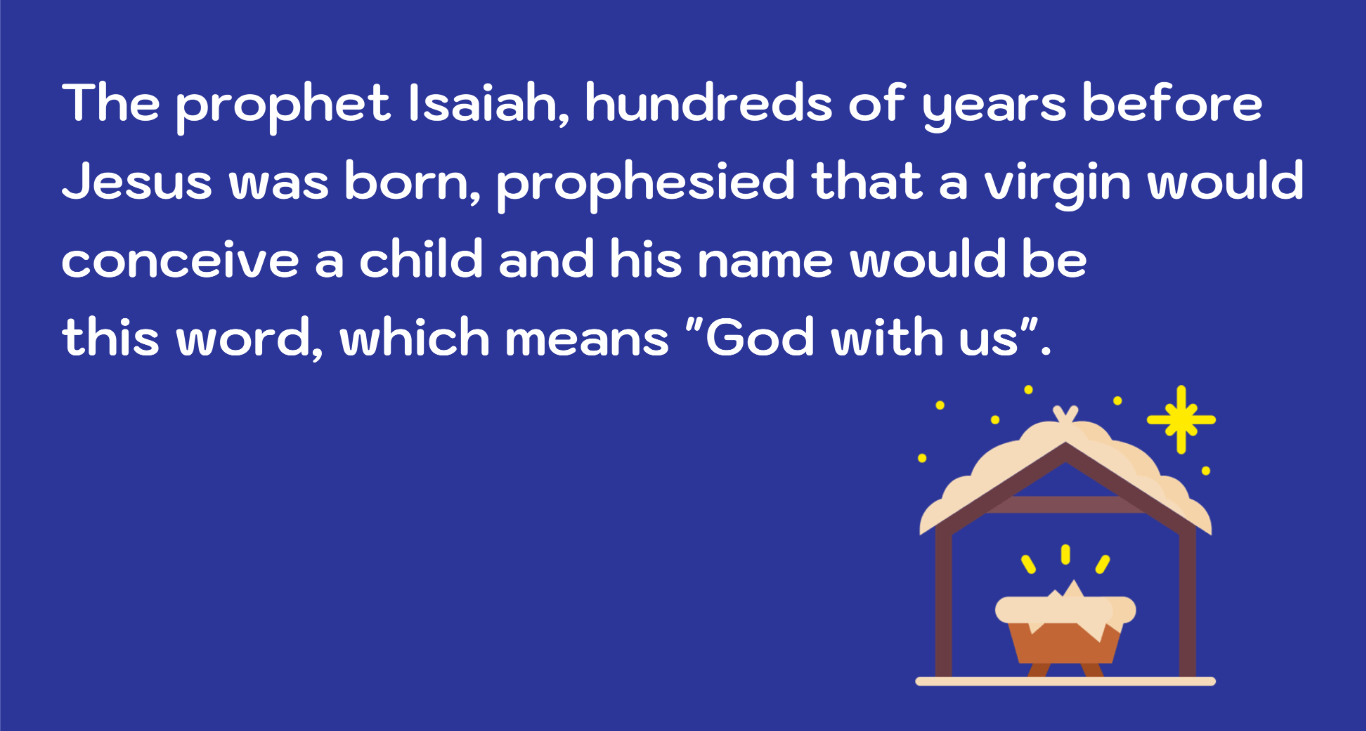
Immanuel
The Prophet Isaiah is one of the major prophets in the Old Testament of the Bible, and he made a number of prophecies about the coming Messiah, or savior, whom Christians believe is Jesus Christ.
One of the most well-known of these prophecies is found in Isaiah 7:14: "Therefore the Lord himself will give you a sign: The virgin will conceive and give birth to a son, and will call him Immanuel."
The name "Immanuel" means "God with us" in Hebrew.
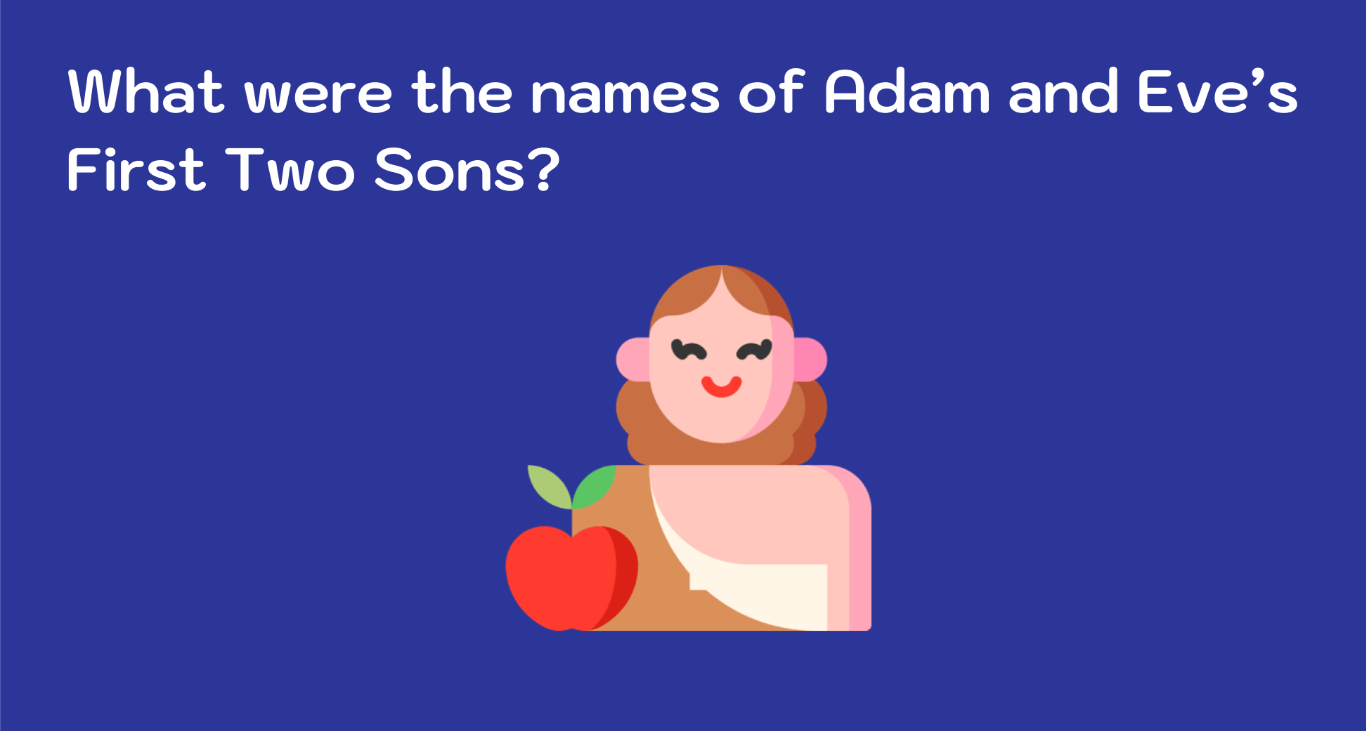
Cain and Abel
Their story marks the Bible's first account of murder, with Cain killing his brother Abel out of jealousy, after God favored Abel's offering over his.
Cain's punishment was not death, but a life of wandering, and he was marked by God with a special sign to protect him from being killed by others. This sign, or "mark of Cain," has been subject of much speculation and interpretation.
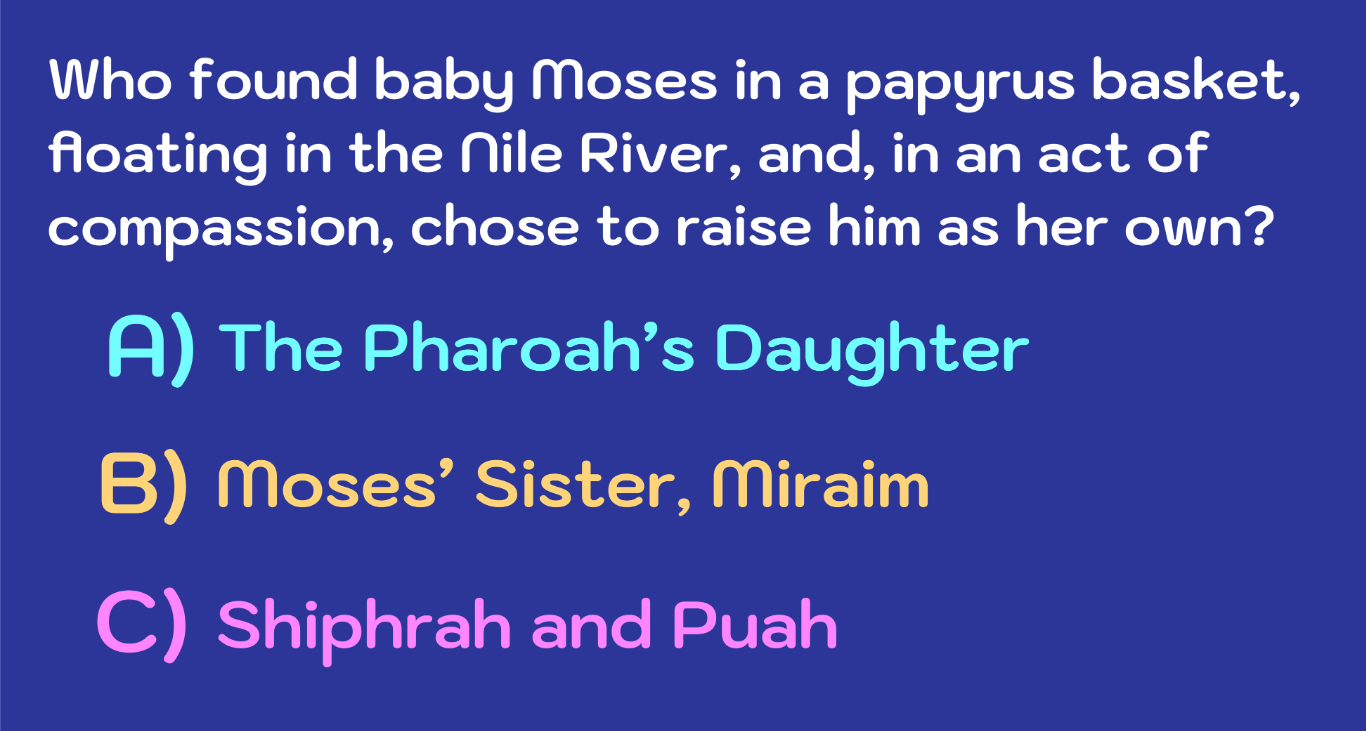
A
The unnamed daughter of the Pharaoh is credited with rescuing baby Moses from the Nile River and raising him as here own son.

Lot's Wife
Lot's wife, who us unnamed in the bible, was turned into salt as a punishment for disobeying the warning given by the angels not to look back at the destruction of Sodom and Gomorrah. Her act of looking back demonstrated a lingering attachment to the sinful city, and thus she suffered the consequences of her disobedience.
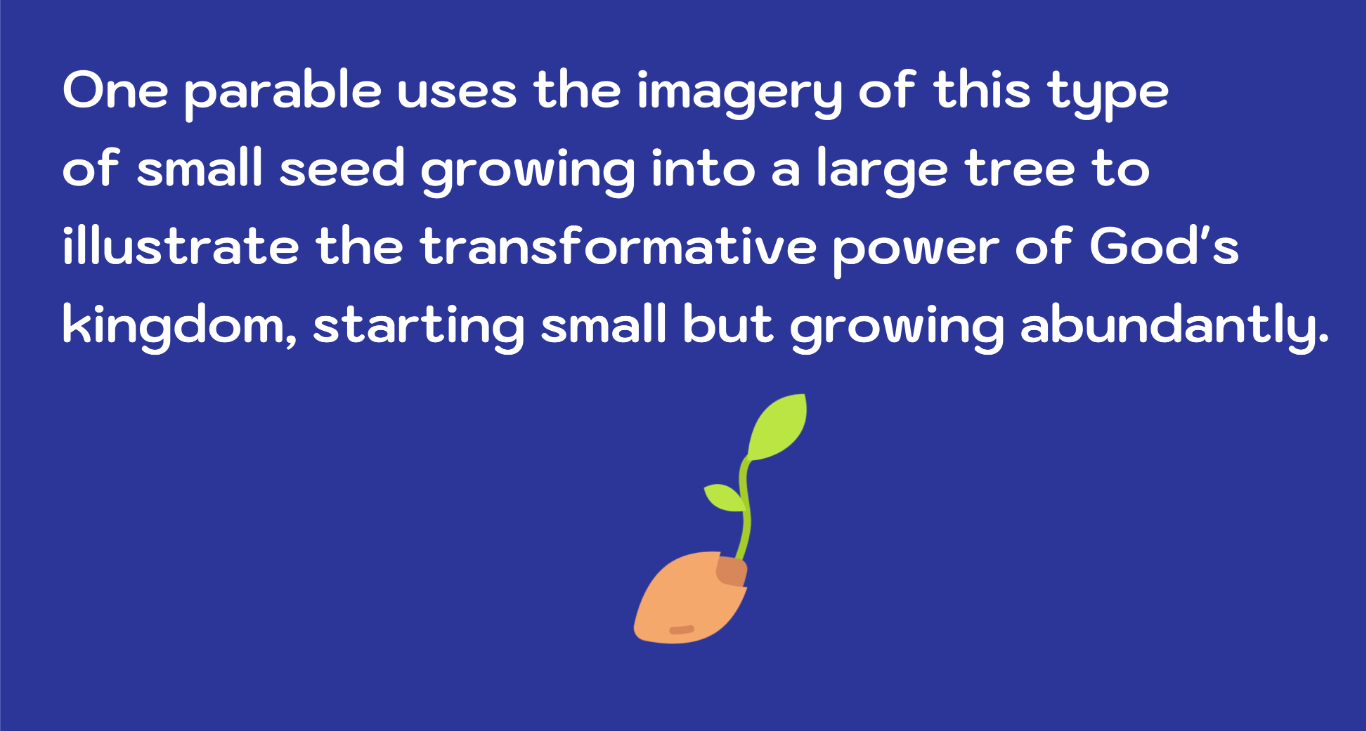
Mustard
The Mustard Seed parable portrays the Kingdom of God as a tiny mustard seed that grows into a large tree, highlighting the transformative and expansive nature of God's kingdom despite its humble beginnings. It conveys the idea that even small acts of faith and discipleship can have significant and far-reaching impacts.

C
The shortest psalm in the Bible is Psalm 117. It consists of only two verses:
"1 Praise the LORD, all you nations; extol him, all you peoples. 2 For great is his love toward us, and the faithfulness of the LORD endures forever. Praise the LORD."
Despite its brevity, Psalm 117 is a powerful call for all nations and peoples to praise and extol the Lord, emphasizing His great love and enduring faithfulness.
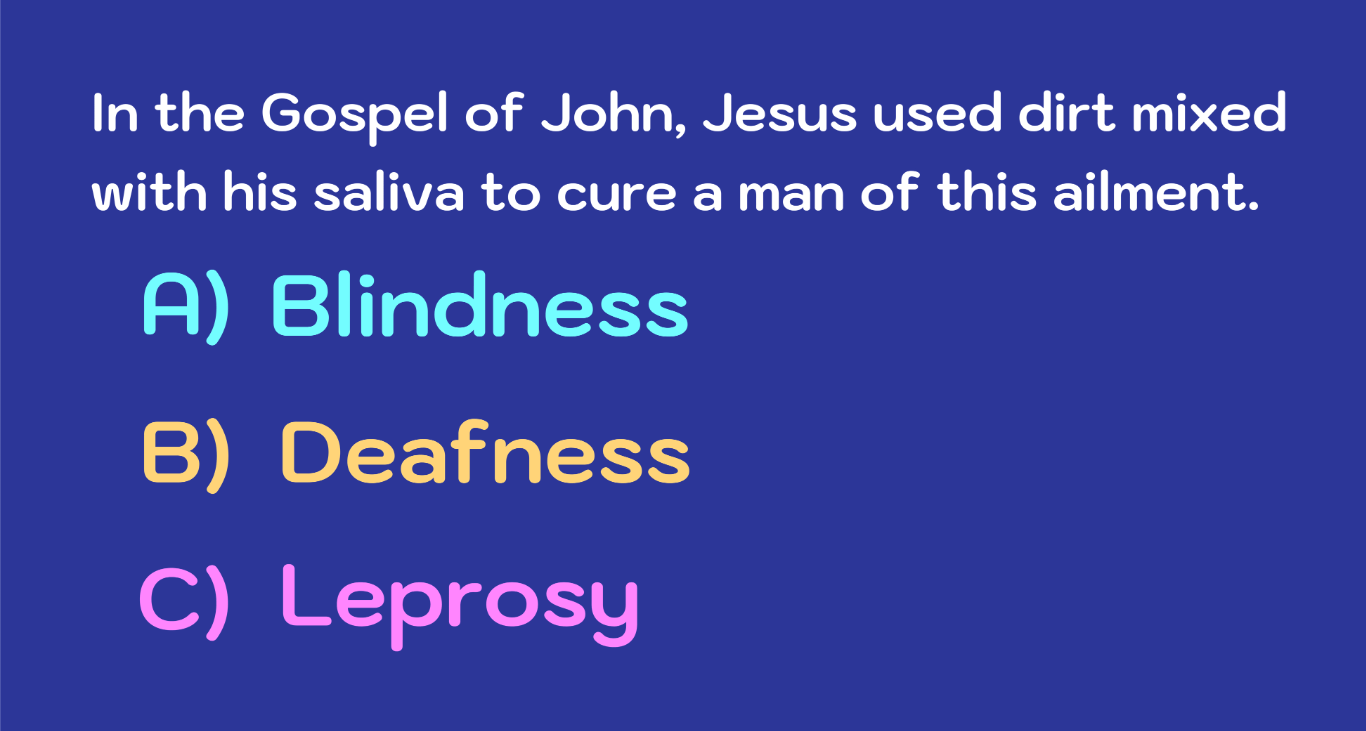
A
According to John 9:1-41, as Jesus was walking along, he saw a man who had been born blind. His disciples asked him, "Rabbi, who sinned, this man or his parents, that he was born blind?" Jesus answered, "Neither this man nor his parents sinned; he was born blind so that God’s works might be revealed in him."
Jesus then spat on the ground and made mud with the saliva, and spread the mud on the man's eyes. He told him, "Go, wash in the pool of Siloam" (which means Sent). So the man went and washed, and came back able to see.
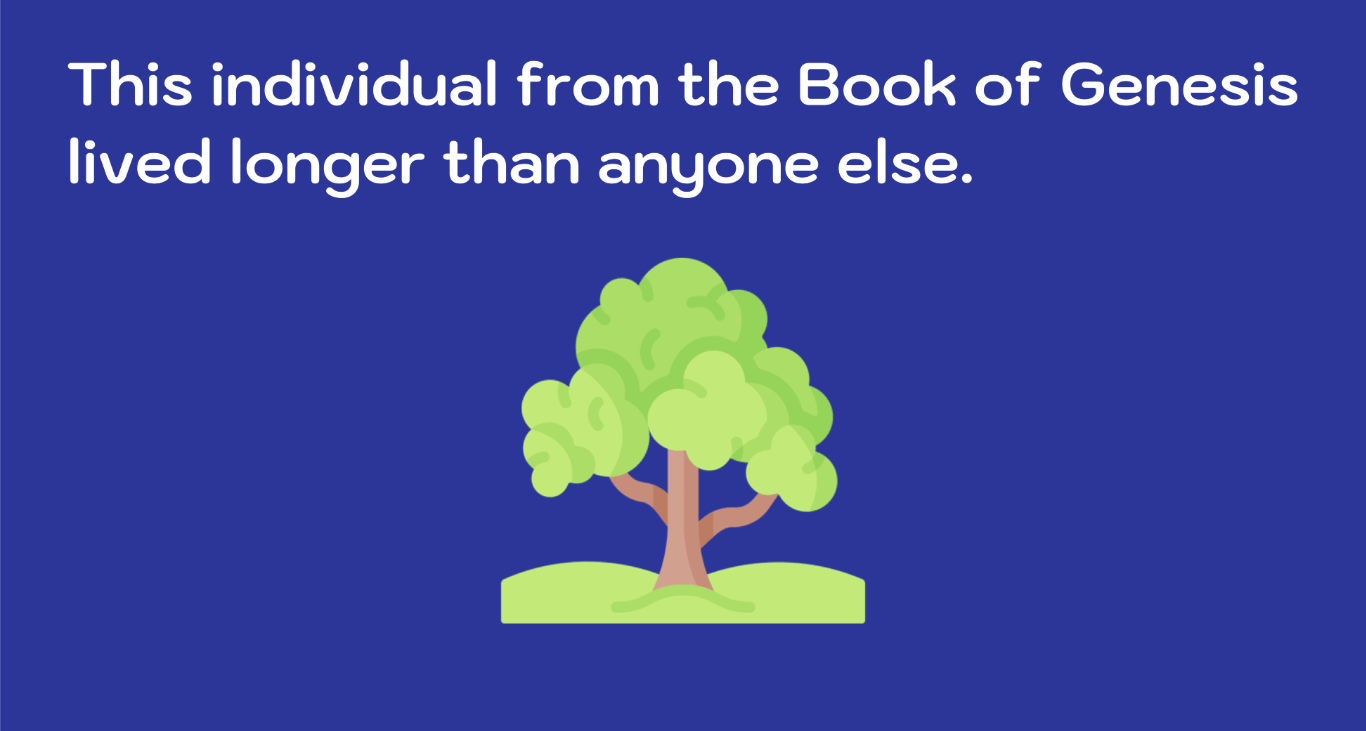
Methuselah
He is reported to have lived 969 years, making him the longest-lived human figure recorded in the Bible.
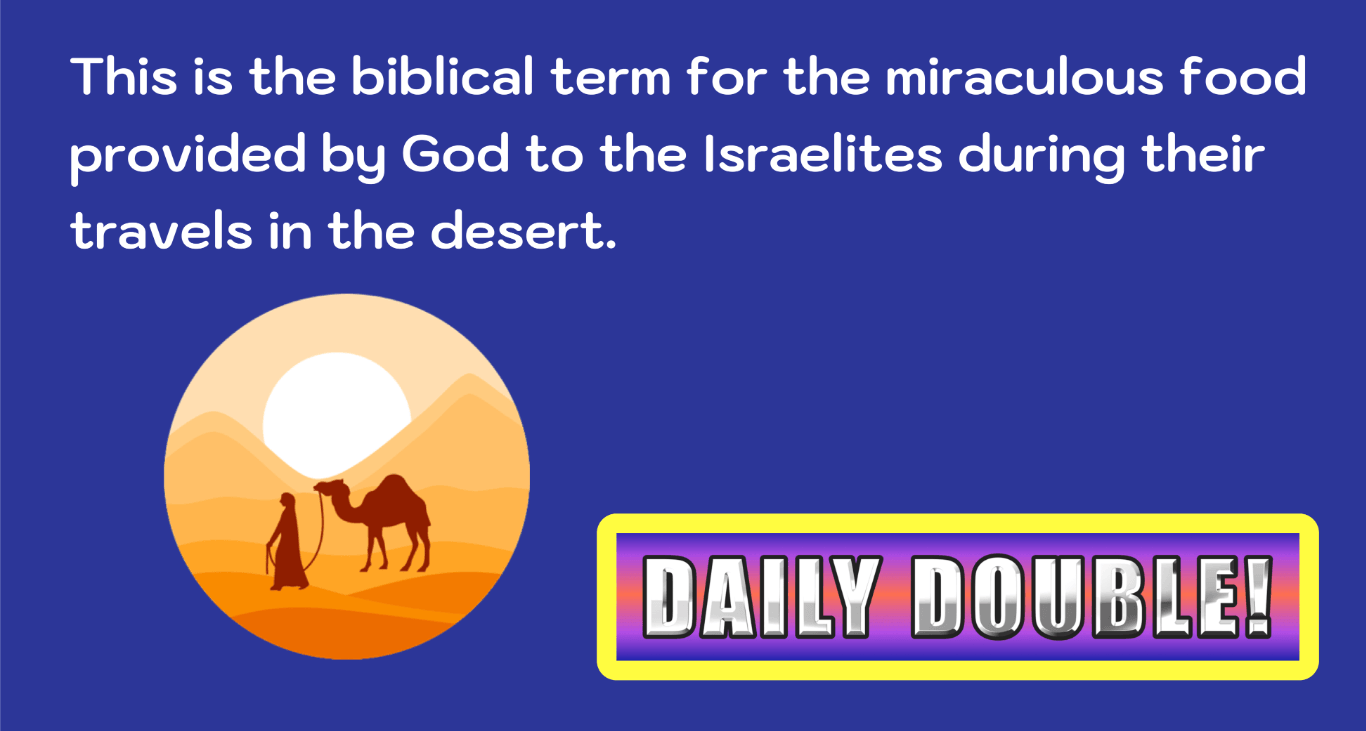
Manna is the food miraculously provided by God for the Israelites during their 40-year journey in the wilderness following their escape from Egypt.
According to the Bible, the manna would appear each morning as a fine flaky substance, as fine as frost, after the dew had evaporated.
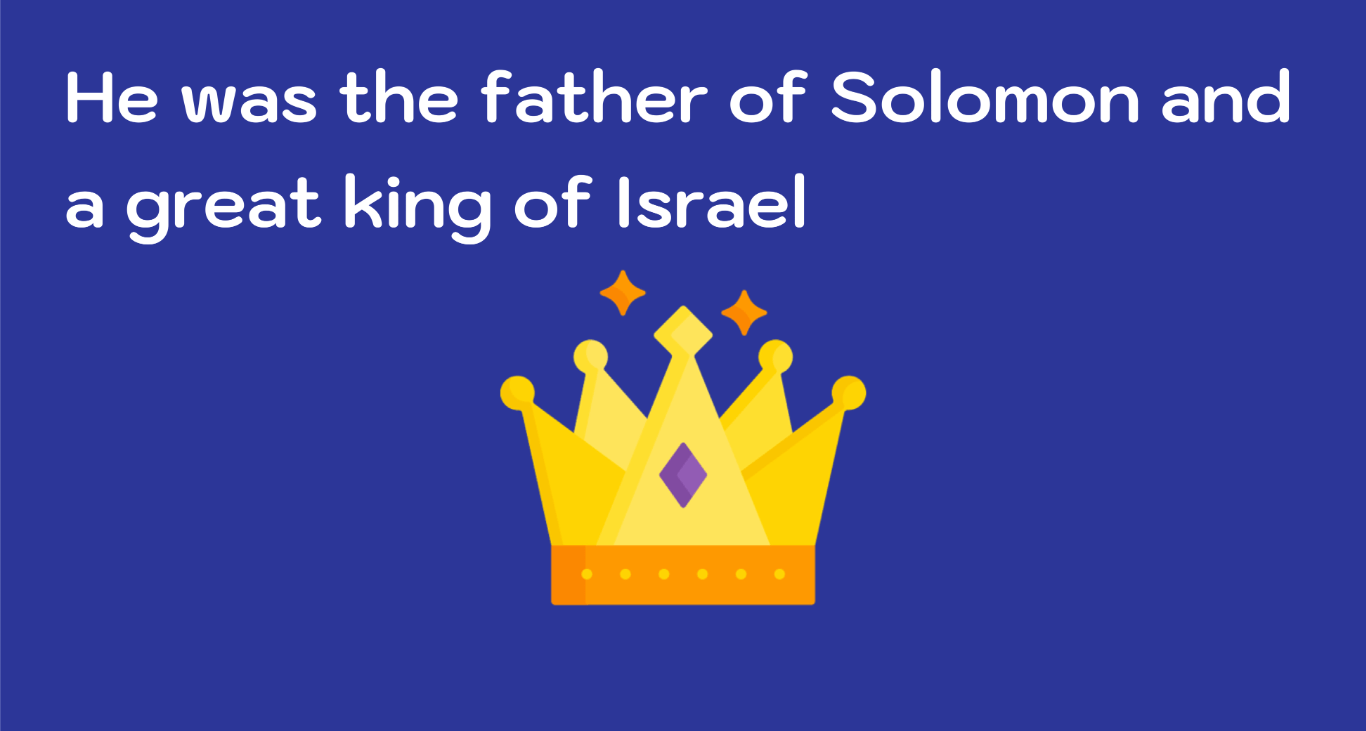
David
King David was anointed as the second king of Israel after Saul. He is known for his bravery, musical abilities, and for being a man after God's own heart. He is credited with writing many of the Psalms and establishing Jerusalem as the capital city of Israel.
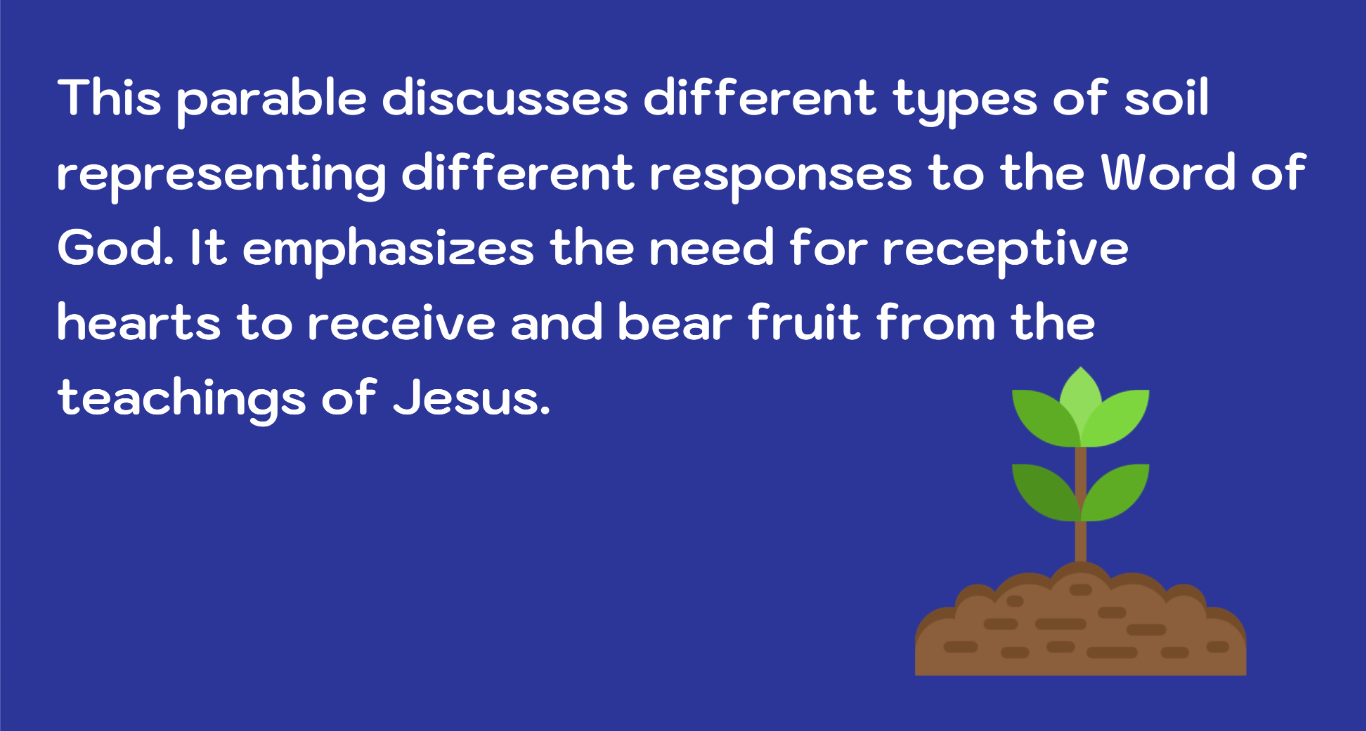
The Parable of the Sower
The Parable of the Sower depicts a sower scattering seeds on different types of soil, representing different responses to the Word of God. It highlights the importance of having a receptive heart to receive and bear fruit from the teachings of Jesus, while cautioning about the potential obstacles that can hinder spiritual growth and understanding.
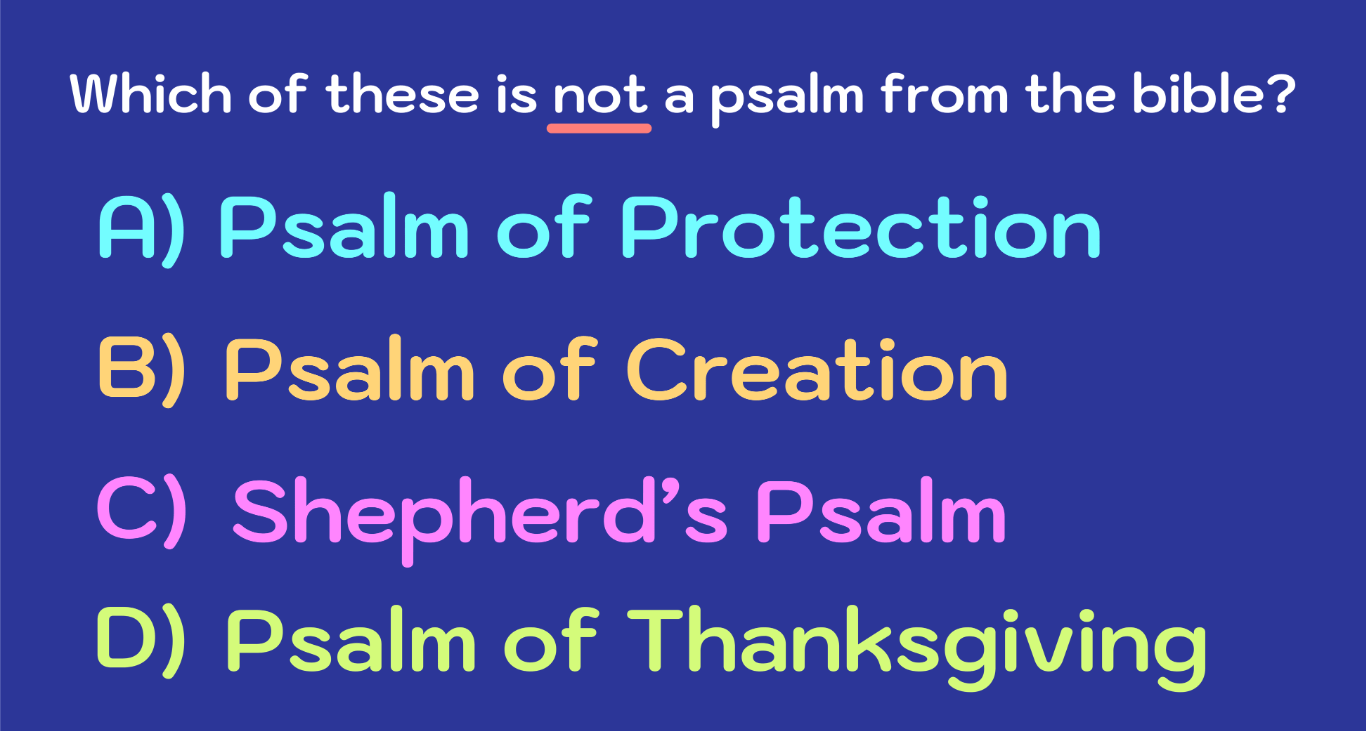
B
Psalm 100 is indeed a beautiful psalm of thanksgiving and praise. Here is the text of Psalm 100:
"1 Make a joyful noise to the Lord, all the earth! 2 Serve the Lord with gladness! Come into his presence with singing! 3 Know that the Lord, he is God! It is he who made us, and we are his; we are his people, and the sheep of his pasture.
4 Enter his gates with thanksgiving, and his courts with praise! Give thanks to him; bless his name!
5 For the Lord is good; his steadfast love endures forever, and his faithfulness to all generations."
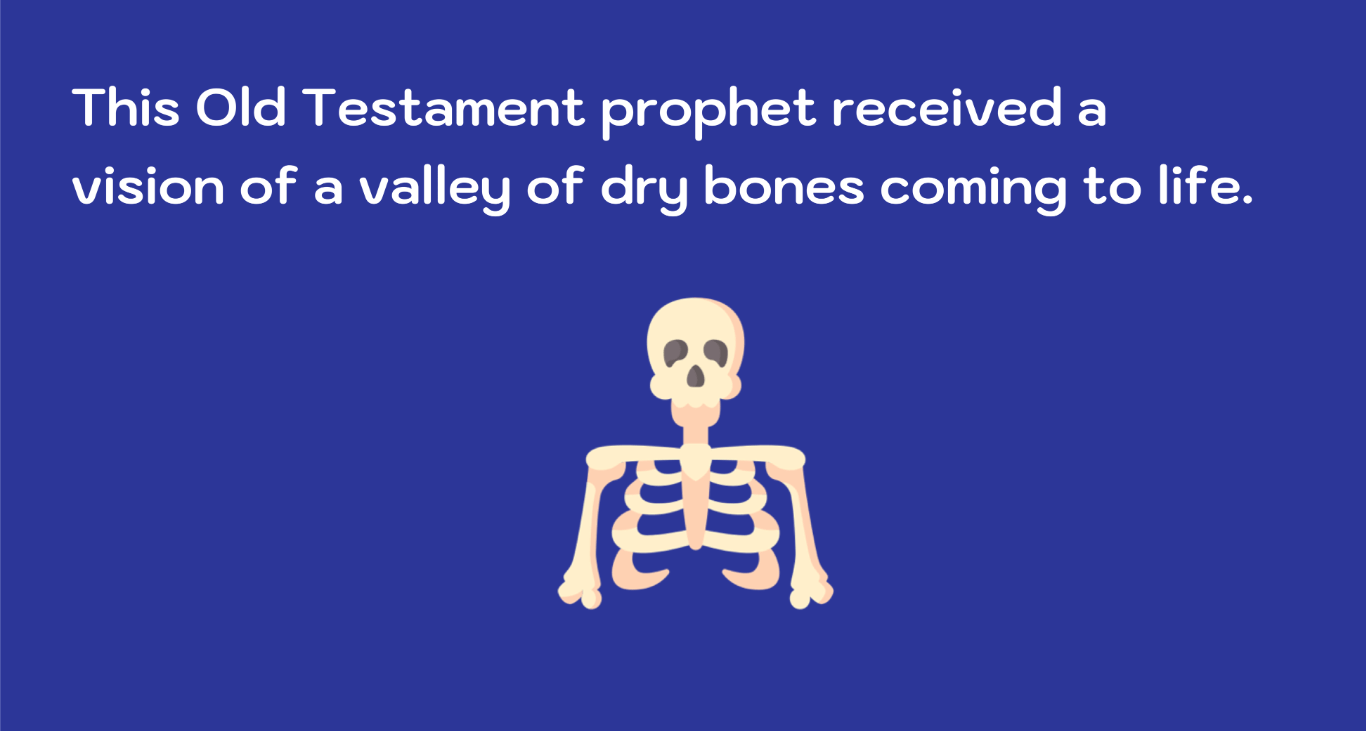
Ezekiel
In a vision from God, the prophet Ezekiel found himself in a valley of dry bones, which God told him represented the despairing house of Israel. God commanded Ezekiel to prophesy over the bones, promising to bring them back to life, symbolizing the restoration and revival of His people. When Ezekiel spoke God's words, the bones reassembled, were covered with flesh and skin, and came to life again, signifying the power of God to restore and give life to what seemed hopelessly dead.
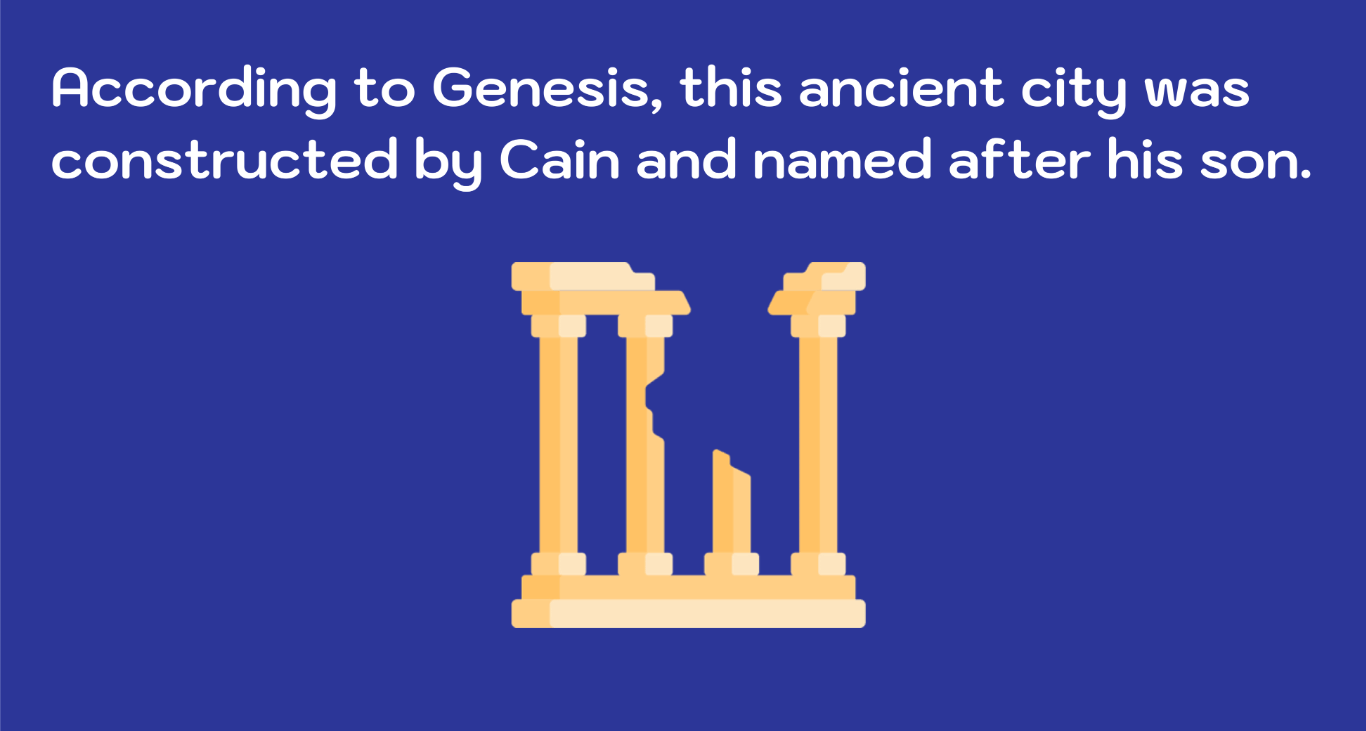
Enoch
According to Genesis 4:17, Enoch was the first city established by Cain, the first son of Adam and Eve. After he was banished by God for killing his brother Abel, Cain went on to build a city, which he named after his son Enoch.
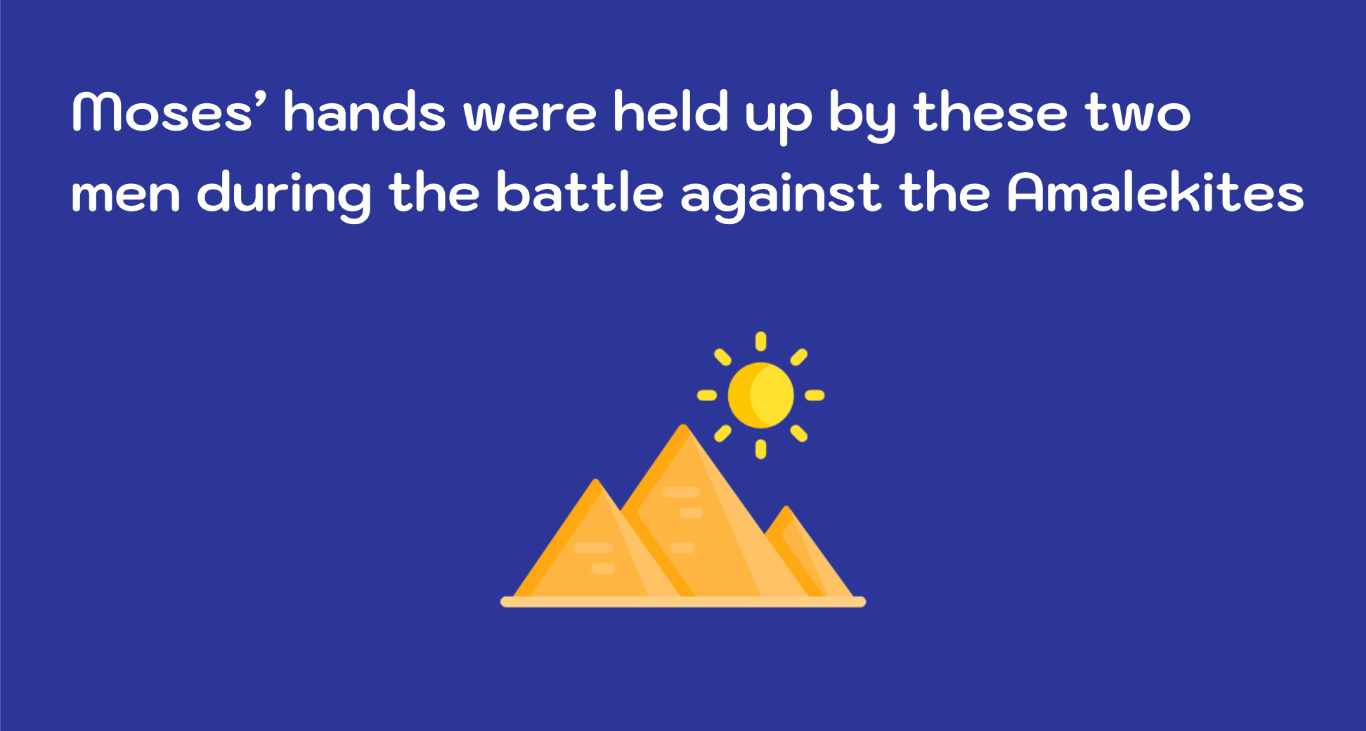
Aaron and Hur
While the Israelites were battling the Amalekites, Moses, Aaron, and Hur went to the top of a hill. As long as Moses held up his hands, the Israelites were winning, but whenever he lowered his hands, the Amalekites were winning. As Moses grew tired, Aaron and Hur held up his hands—one on one side, one on the other—keeping them steady until sunset, and the Israelites won the battle.

Elijah
The prophet Elijah ascended to heaven in a whirlwind, accompanied by a chariot of fire, as recorded in the Bible. He was taken up in a miraculous event witnessed by his successor, Elisha, and it symbolized his departure from Earth and his translation into the presence of God.
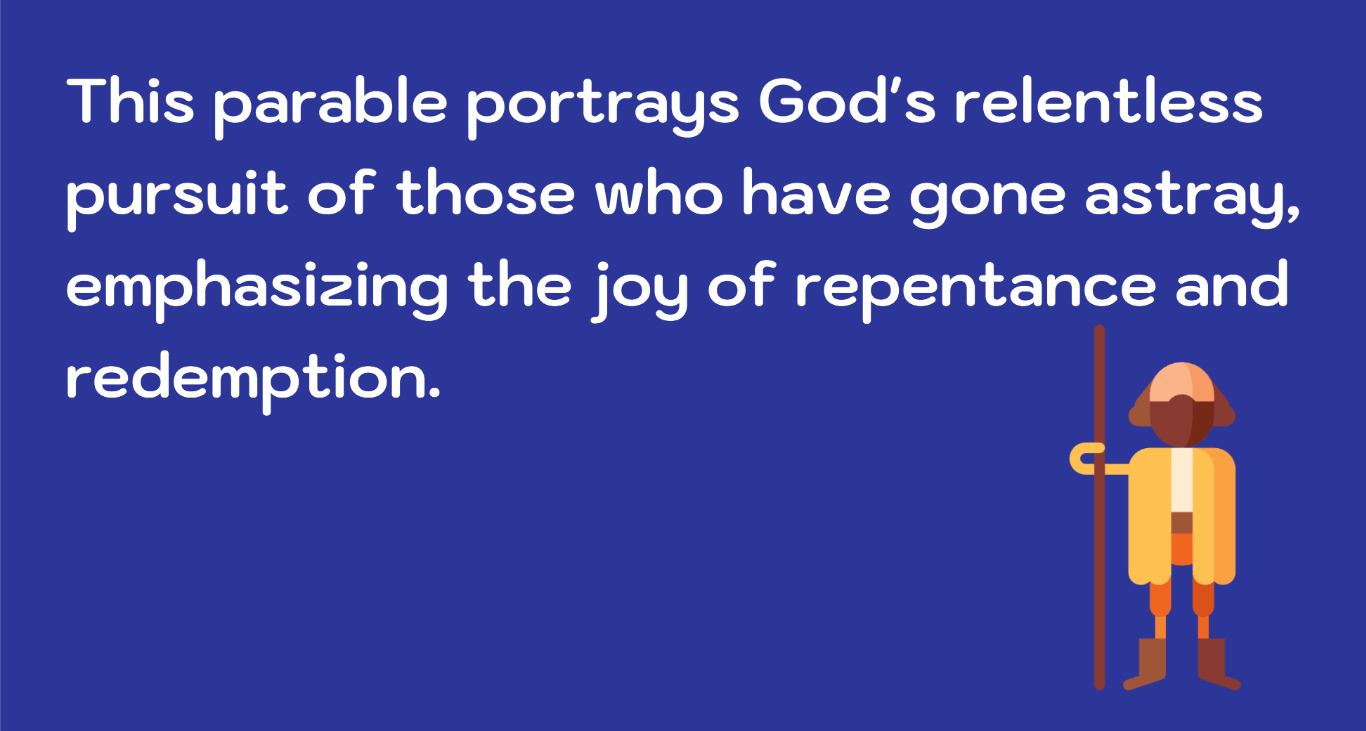
The Parable of the Lost Sheep (Luke 15:3-7)
The Parable of the Lost Sheep tells the story of a shepherd who leaves his flock of 99 sheep to search for one that has gone astray. It illustrates God's relentless pursuit of those who have wandered away, emphasizing the joy of repentance and redemption when the lost is found.

Psalm 121
"1 I lift up my eyes to the mountains— where does my help come from? 2 My help comes from the Lord, the Maker of heaven and earth.
3 He will not let your foot slip— he who watches over you will not slumber; 4 indeed, he who watches over Israel will neither slumber nor sleep.
5 The Lord watches over you— the Lord is your shade at your right hand; 6 the sun will not harm you by day, nor the moon by night.
7 The Lord will keep you from all harm— he will watch over your life; 8 the Lord will watch over your coming and going both now and forevermore."
Psalm 121, a Song of Ascents, is a comforting psalm that acknowledges the help and protection that comes from the Lord. It emphasizes God's constant watchfulness and care over His people, assuring that He will guard them from harm both now and forever.
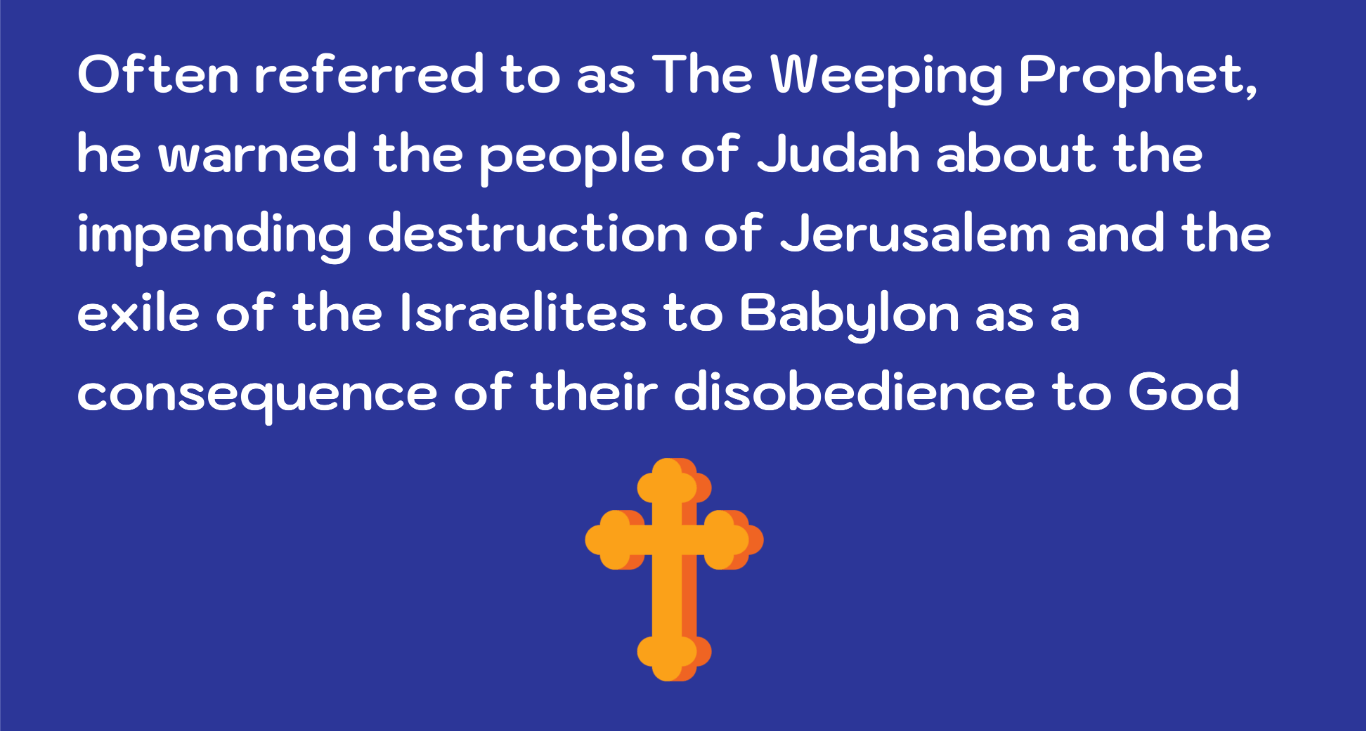
Jeremiah
Jeremiah was a prophet who lived during the late 7th and early 6th centuries BCE in ancient Judah. He was known as the "Weeping Prophet" due to his deep sorrow and empathy for his people and the messages of impending judgment he delivered. Despite facing opposition and persecution, Jeremiah remained steadfast in his role as a messenger of God, faithfully proclaiming God's words of warning, judgment, and hope for the future of Israel.